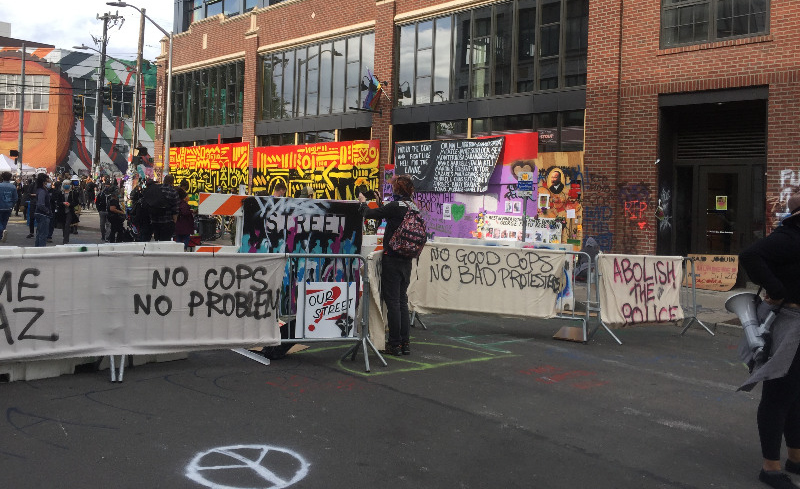
The protests over police killings have stressed the Seattle political system, possibly to the breaking point. Are there ways to salvage the situation? Let’s look at some of the possible paths forward.
For starters, what are the new realities that any remedies will have to take into account? Mayor Jenny Durkan is a weakened politician, on the defensive, and without a strong base of support. In coping with what is now ethnic politics, she has three disadvantages: explaining why the police response to demonstrations was so escalatory; the fact of the mayor’s whiteness; and the absence of high-level Black advisers in her office.
Nor will the Seattle City Council be much help, drawn as the majority is to Movement-Left politics and with no one really serving as the mayor’s eyes and ears and conduit. The street protests against police will now morph into a prolonged battle between the mayor and council over the police budget. Embittering all this will be the maneuvering over the 2021 mayor’s race, with Durkan now more vulnerable and the city council full of rivalries and ambitions.
Emotions are running high, making compromise (for the moment) difficult to engineer. Given all the other major problems facing the city — a hard-times budget, the West Seattle bridge, economy in free-fall, the pandemic, race-politics taking to the streets — there is unlikely to be a simmering-down period. One thing that will help is the withering away of CHOP, the occupied protest zone on Capitol Hill, which is being wisely allowed by the mayor to arrange its own terms of surrender-as-victory.
Two groups likely hold the key to progress. One is Black Lives Matter, which has an issue-focus on police reform but needs to get some distance from its CHOP partners on the far/libertarian/utopian Left. The other group is labor, which is now the key driver of Seattle politics (by default). Labor (particularly SEIU and the Culinary Workers) can pressure the Police Union and has serious leverage with the city council and the mayor.
The key question: are there the makings of a grand political bargain? It’s not difficult to imagine the components of such a detente, which I would sketch out this way. First is the creation of a new public safety department, with more emphasis on trained specialists dealing with traffic violations, homeless, drug cases, and mental-health episodes. This article in Vox provides a good list of the reinvention of policing in other cities. Second is for the mayor to correct the absence of Black deputies at a high and trusted level in the mayor’s office. Third is some way to honor the CHOP encampment as a memorial to this outbreak of Seattle’s long tradition of street protests. Fourth is some significant initiative aimed at improving the lives of Seattle minorities. It would be best focused on jobs given the economic meltdown. It also needs to allow community voices more say, Model-Cities-style, in creating and running these programs.
Much harder is imagining the path to getting to these (or better) goals. Here are some possible routes:
Detente with the City Council. One obvious way to effect this is for Mayor Durkan to create an alliance with the most effective leader of the non-Sawant progressive majority of the council, Teresa Mosqueda, who in turn is most closely linked to labor unions. The way to start this alliance would be for Durkan to work out an agreement with Mosqueda on her business tax proposal, and also to find new funds for affordable-housing construction.
Create a pragmatist coalition. Such a group, led by someone who is a fresh voice and a skilled coalition-builder, would give the public and the media an effective foil to the unchallenged leftward drift of Seattle politics. That leader in turn would be a rallying point for a post-Durkan mayor’s race, though in the meantime strengthening the mayor’s centrist politics and tossing in new proposals as a kind of shadow-mayor. There are remnants of earlier efforts (the business coalition that got a late start in the 2019 city council races, the All-In-Washington donors and backers) that could be components of a broader political coalition to counter the Movement-Left-Labor domination of local politics.
Shift the narrative to the economy. For most Seattleites, surviving the coronavirus economy ranks higher than police reform and overturning structural racism. So put forth serious proposals to fast-track the West Seattle Bridge, build housing, sustain social-service nonprofits, create more equitable taxes, build and repair infrastructure, and rescue our endangered university and research sector. Another advantage of this approach is that there are some natural political allies of note: the Downtown Seattle Association, the Chamber of Commerce, Challenge Seattle (prominent CEOs led by Chris Gregoire), restaurateurs, and the arts organizations.
Outside help in mediation. If City Hall has seized up politically, turn to an outside institution such as the Ruckelshaus Center, a UW- and WSU-based institution highly skilled in conflict resolution. Or find an equivalent to Ed Muskie, who negotiated peace in Northern Ireland. Some names to ponder: Patty Murray, Bob Gates, Sally Jewell, Norm and Constance Rice, Melinda Gates.
Community-based de-escalators. This is an idea from the CHOP zone, meant to keep peace and ward off disrupters. It would make sense to take a good idea from the protests and widen it to neighborhoods by empowering peacekeepers and solution-seekers. These individuals might rise out of a well-planned Summit on Public Safety, along the lines of Mayor Rice’s Education Summit in 1990, a very successful effort that got Seattle out of an unpopular school-busing program.
The key thing, in a time of despair and polarization, is to have plan for making omelets, not just tip-toeing on all the cracked eggshells. Madame Mayor, give us a trail guide out of this dark forest!
